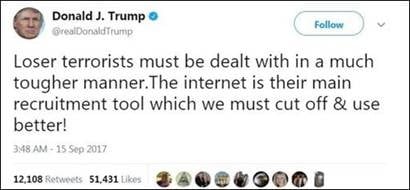The following is an op-ed by MEMRI Executive Director Steven Stalinsky that was originally published in The Hill on February 8, 2018.[1]
In December 2017, the Trump administration released its first National Security Strategy; it laid out the strategic vision for protecting the American people and advancing American influence in the world. The document referred to cyber issues in several areas, including terrorist use of encryption and the need for assistance from the tech community. It noted: "Time and territory allow jihadist terrorists to plot, so we will act against sanctuaries and prevent their reemergence before they can threaten the U.S. homeland. We will go after their digital networks and work with private industry to confront the challenge of terrorists … 'going dark' and using secure platforms to evade detection."
Since taking office, President Trump has not said much except through a few tweets and small references in speeches about cyber jihad — that is, terrorist activity online. Following the September 2017 Islamic State attack on the London Underground, he tweeted: "Loser terrorists must be dealt with in a much tougher manner. The internet is their main recruitment tool which we must cut off & use better!

In an Aug. 23 speech to the National Convention of the American Legion, President Trump mentioned plans for addressing cyber jihad: "We are going to start working very hard on the Internet, because they are using the Internet at a level that they should not be allowed to use the Internet. They are recruiting from it, and we are going to work under my administration very hard so that doesn't happen."
During his election campaign, one of his recurring themes in discussions and debates on the war on terrorism was stopping cyber jihad. In his first debate against Hillary Clinton, on Aug. 27, 2016, he stated: "When you look at what ISIS is doing with the Internet, they're beating us at our own game." In an exchange with CNN's Wolf Blitzer during the Dec. 15, 2015 Republican presidential candidate debate, he explained: "ISIS is recruiting through the Internet. ISIS is using the Internet better than we are using the Internet, and it was our idea... [I want] to get our brilliant people from Silicon Valley and other places and figure out a way that ISIS cannot do what they're doing."
Throughout President Trump's first year in office, few details have been released regarding the plans for, or implementation of, actions or policies in fighting terrorist activity online he referred to. But one year ago, just prior to his inauguration, MEMRI published a paper setting out a strategy for President Trump to follow: "The incoming Trump administration will have to deal with jihadis' increased use of encrypted apps, and whatever social media emerge next... If it does not move swiftly, the progress made over the past year on this issue may be lost; jihadis have shown great persistence in continually identifying and exploiting the weaknesses of these platforms, as well as constantly moving to modern technologies and staying two steps ahead of Western security agencies."
The paper continued with suggesting that Trump "bring Silicon Valley experts together with researchers who have also spent years working on the terrorist cyber threat issue into a Bletchley Park-type setting. Cyber scholars such as John Arquilla, professor at the Naval Postgraduate School, have for years been calling for such a move." More recently others have joined these calls including Dr. Haroon Ullah, chief strategy officer at the Broadcasting Board of Governors and former senior advisor for countering violent extremism and public diplomacy at the State Department, wrote in his recently published book Digital World War that Western governments need a new Manhattan Project to fight ISIS online.
Since President Trump's inauguration, terrorist organizations have expanded their online activities. As ISIS's physical caliphate has crumbled, its cyber caliphate has strengthened. It has intensified its recruiting outreach to Westerners — and more Americans are joining. Jihadis' dependence on the Germany-based encrypted app Telegram has increased and gone unchallenged, as jihadis test a new generation of products from social media companies, most of them offering encryption. Additionally, jihadis online are experimenting with more recruitment methods, and even fundraising, including in Bitcoin.
The Trump administration needs to be concerned not only with cyber threats from the Russians, North Koreans, and Iranians, but also from terrorist organizations. Jihadi hacking groups targeting the U.S. may not get a lot of attention but their activities persist. An example is the pro-ISIS hacker group Caliphate Cyber Ghosts (CCG) which recently released a video declaring "electronic war" on the U.S. and claiming it had already hacked into sensitive websites belonging to the U.S. Army, the State Department, and other government entities. As we have seen from the false ballistic missile text-alert episode in Hawaii, a great deal of chaos can result from small cyber actions.
*Steven Stalinsky is Executive Director of MEMRI.
[1] Thehill.com, February 8, 2018.





